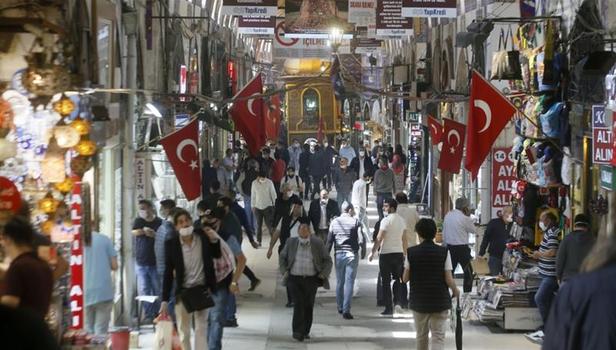Can the corona virus be controlled without lockdown?
04 Jun 2020 ( IBTN News Bureau )
The corona virus arrived in Turkey late. The first case of infection was registered here on 19 March. But soon it spread to every corner of Turkey. Within a month, the corona virus had spread to all 81 provinces of Turkey.
Turkey was the fastest spreading corona infection in the world. Things were worse than China and Britain. There were apprehensions that there would be deaths on large scales and Turkey would also leave Italy behind. At that time Italy was the most affected country.
Three months have passed, but this is not so, even when Turkey has not implemented a complete lockdown.
Turkey has officially confirmed 4397 deaths from corona infection. Claims are being made that the actual number may be up to two times as only those in Turkey have been included in the death toll whose test reports were positive.
But if compared to other countries, this number is less for this country with a population of eight and a half crore.
Experts warn that it is difficult to arrive at a conclusion about the corona infection or to compare the figures of the two countries, even when deaths continue in many countries.
But according to Dr. Jeremy Rossman, a lecturer in virology at the University of Kent, "Turkey has avoided waste."
He told the BBC, "Turkey is among the countries that responded very quickly. Especially in terms of testing, identifying, isolating and preventing movement. Turkey is among the few countries that have managed to effectively reduce the virus's pace.
As the speed of the virus was increasing, the authorities imposed various restrictions on everyday life. There was a ban on going to the coffee house, shopping stopped, mass prayers were stopped in mosques.
People above sixty-five years of age and below twenty years of age were completely locked up in lockdown. Curfews were imposed over the weekend and main cities were sealed.
Istanbul was the epicenter of the epidemic in Turkey. The city lost its pace, as if a heart stopped beating.
Now restrictions are gradually being relaxed, but Dr. Mele Noor Aslan still remains vigilant. She is the director of health services in Fatih district. It is a congested area in the center of Istanbul. The energetic and talkative Dr. Aslan is leading the contact tracing campaign. There are six thousand teams of contact tracing expeditions across Turkey.
She says it feels like we are on the battlefield. People on my team forget to go home, even after eight hours they keep working. They do not care to go home because they know that they are performing their duty.
Dr. Mele Noor Aslan says that she started tracking the virus from the very first day of March 11, her experience of tracking the measles disease.
She says, "Our plan was ready." We just took out our files from the cupboard and we went to work. ''
We joined two doctors in the narrow streets of Fatih. These doctors, wearing PPE kits, were using an app. They went to a flat in an apartment where two young women were in Quarantine. Her friend is Covid positive.
In the corridor of the apartment, both women were tested for Covid, they would receive the report within twenty-four hours. He started showing mild symptoms a day earlier. 29-year-old Mazali Demir Alpa is thankful that she has received a quick response.
She says, "We hear news from abroad. Initially when we came to know about the virus, we were very scared but Turkey worked faster than we thought. It worked much faster than Europe or America." "
Turkey used hydroxychloroquine
Dr. Irshad Sheikh, the acting head of the World Health Organization in Turkey, says that Turkey has many lessons for the world about public health.
He told the BBC, "Initially we were worried. Up to three and a half thousand new cases were coming in every day. But the testing took a lot of work. And people didn't have to wait five-six days for the results."
He also attributed the success of Turkey to the contact tracing, quarantine and isolation policy of Turkey.
In Turkey, patients were also given hydroxychloroquine. It was highly praised by US President Donald Trump, but international research has rejected the drug.
The World Health Organization has stopped the trial of this drug as a treatment for corona. A research paper published in the medical journal Lancet claimed that this drug increases the risk of cardiac arrest in Covid-19 patients and may lead to more harm than good.
We were allowed to go to hospitals where thousands of people have been given hydroxychloroquine as medicine. Dr. Sehit Ilhan Waranka Hospital, built two years ago, remains the center of the fight against Covid.
The Chief Doctor here, Nurettin Yeeyat, says that it is important to use hydroxychloroquine in the beginning. Dr Yeeet's paintings are on the walls of this new shiny hospital.
She says, "Other countries have started using this medicine lately, especially the US, we use it only in the initial days, we have no hesitation about this medicine. We think it is impressive because we are getting results.''
While visiting the hospital, Dr. Yeeit says that Turkey has tried to stay ahead of the virus. We have initially treated and adopted an aggressive attitude.
In addition to hydroxychloroquine, doctors use drugs, plasma and large amounts of oxygen.
Dr. Yeeyat is proud that the rate of death of Covid in his hospital has been less than one percent. Here beds are empty in intensive care unit ie ICU. They try to keep patients out of here and without ventilators.
We met forty-year-old Hakim Sukuk, who is now returning home after receiving treatment. He is thankful to the doctors.
He says, "Everyone has taken care of me a lot." It felt like I am in my mother's lap.''
The Turkish Medical Association has not yet given a clean chit to the government's response to the epidemic. The association says that there were several shortcomings in the way the government took steps on the epidemic.
These include leaving the boundaries open.
Although the World Health Organization is giving some credit to Turkey. Dr. Sheikh says, "This epidemic is in its early days. We think many more people will be seriously ill. There is something that is going well.''
Turkey also has many things in its fight against the Corona epidemic. For example, the young population and the greater number of ICU beds. But still about a thousand new cases are coming up every day.
Turkey is seen as a story of success in the fight against Corona, but still needs to be cautious as the story is not over yet.
(Click here for Android APP of IBTN. You can follow us on facebook and Twitter)
Share This News
About sharing
-
 16 Sep 2025
UN inquiry finds Israel’s war on Gaza to be genocide
16 Sep 2025
UN inquiry finds Israel’s war on Gaza to be genocide
UN inquiry finds Israel’s war on Gaza to be genocide
-
 16 May 2025
Has Donald Trump taken US-Gulf relations to a new era?
16 May 2025
Has Donald Trump taken US-Gulf relations to a new era?
Has Donald Trump taken US-Gulf relations to a new era?
May 16, 2...
-
 16 May 2025
What do the Gulf states gain from the US president's historic trip to the region?
16 May 2025
What do the Gulf states gain from the US president's historic trip to the region?
What do the Gulf states gain from the US president's historic trip to the regio...
-
 15 May 2025
Pakistan FM: US didn't force the ceasefire with India | Talk to Al Jazeera
15 May 2025
Pakistan FM: US didn't force the ceasefire with India | Talk to Al Jazeera
Pakistan FM: US didn't force the ceasefire with India | Talk to Al Jazeera
-
 15 May 2025
How will the lifting of US sanctions help Syrians rebuild their country?
15 May 2025
How will the lifting of US sanctions help Syrians rebuild their country?
How will the lifting of US sanctions help Syrians rebuild their country?



